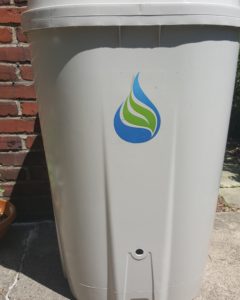 Al and I got a rain barrel this week. For $85, we got the barrel, the spigot, instructions and a very informative lecture – not just on how to use the rain barrel, but about the threats to safe drinking water in Pennsylvania and what we all can do to protect our water resources.
Al and I got a rain barrel this week. For $85, we got the barrel, the spigot, instructions and a very informative lecture – not just on how to use the rain barrel, but about the threats to safe drinking water in Pennsylvania and what we all can do to protect our water resources.
The most important thing we learned is why our rain barrel is important. We thought it was just a way of saving money during summer dry spells when we have a lawn and garden to water. We hope it will be that, but it has the even more vital function of reducing the load on our sewer systems.
Water that runs off your roof into a downspout can contribute to storm sewer overload. Storm sewer overload results in storm water being diverted into a Combined Sewer System, leading to Combined Sewer Overflow: the discharge into our groundwater, rivers and streams of storm runoff mixed with untreated sewage. Yuck!
Our rain barrel will allow us to collect rain water that otherwise would have gone into storm sewers, and then use it to water our yard during dry spells. Rather than contributing to sewer overload, the collected rainwater will seep through the ground and return to our water supply filtered by soil and roots, as nature intended. Now I feel virtuous as well as thrifty!
We learned many other ways to help protect our water resources. Most of them are pretty easy, and Al and I will be putting them into practice in the coming months. Here are a few:
- Recycle used motor oil and anti-freeze, and other hazardous waste (here is information about hazardous waste recycling in Allegheny County: ZEROWASTE). NEVER dump it in a storm sewer, or you could be drinking it next time you’re thirsty! If auto fluids leak onto your driveway, absorb them with kitty litter, rather than hosing them onto the street, where they will run into the nearest storm sewer.
- Always clean up after your dog. Do you want to drink dog poop that ran off into a storm sewer? Neither do I.
- Limit your use of chemical fertilizers, herbicides and pesticides. Water frequently (from your rain barrel!) or use mulch instead of herbicides as much as possible. Use natural, non-toxic products. Corn gluten meal is one natural weed killer.
- Use green cleaning supplies. Make your own, or use products such as Meyers or Seventh Generation.
- Limit your use of plastics as much as you can. I know it’s hard, but I feel newly committed after learning about the Great Pacific Garbage Patch. Read about it HERE.
More information is available from the Pennsylvania Resources Council. I strongly encourage you to check out their intranet site.
